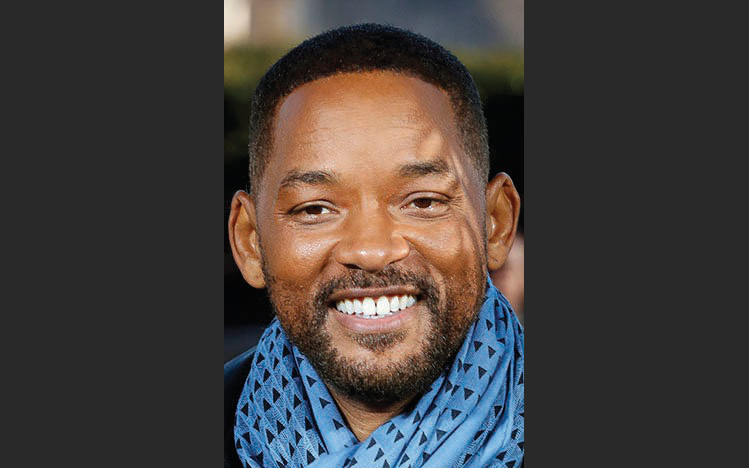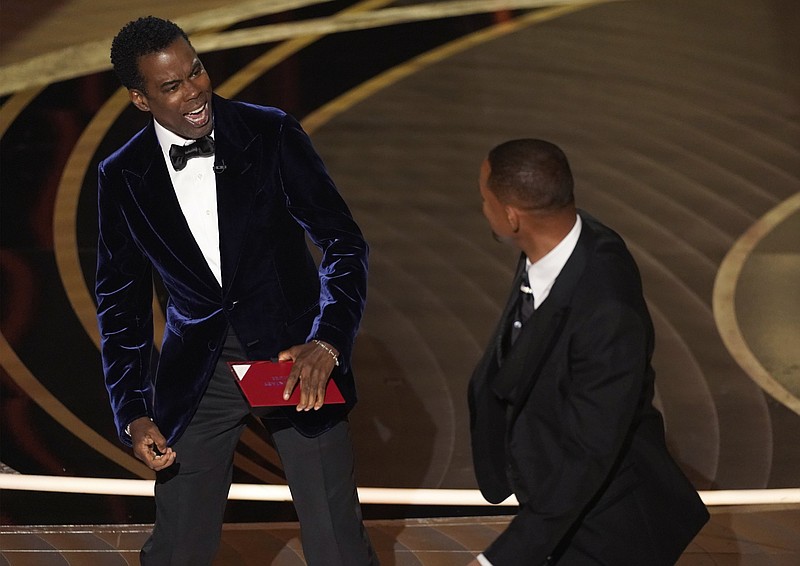- If we were truly brave we should not accept a challenge, but we are all cowards.
- — New York businessman Matthew Clarkson to Gouverneur Morris, after the death of their mutual friend, Alexander Hamilton, in a duel on July 12, 1804
I do not know how Will Smith felt in the small hours of Monday morning, in the aftermath of what should have been one of the greatest nights of his life. But I do know that the last time I hit a man, he was threatening me with a screwdriver, trying to rob me of more than I could stand to lose at that point in my life.
That was more than 30 years ago. It still bothers me. I still keep myself awake; nearly make myself sick thinking about it.
I wasn't watching live when Smith slapped comedian Chris Rock onstage at the Dolby Theater during the Academy Awards broadcast Sunday night; we turned the telecast off just before Rock came on to present the award for the year's best documentary.
The first time I saw the incident was via an "unedited" video provided by U.K. newspaper The Guardian. Viewers watching live missed some of the exchange between Smith and Rock in the wake of the slap — they didn't hear Smith shout, "Keep my wife's name out of your f***ing mouth!" at Rock.
Rock's offense was telling a joke — maybe not a very good joke — about Hollywood, and the professional jealousy that afflicts actors.
"Javier Bardem and his wife are both nominated," Rock said, noting that Bardem and his wife, Penelope Cruz, were up for Best Supporting Actor and Best Supporting Actress awards. "Now, if she loses, he can't win.
"He is praying that Will Smith wins, like, 'please, lord.'"
Rock then turned his attention to Smith's wife, Jada Pinkett Smith.
"Jada, I love you. 'G.I. Jane 2,' can't wait to see it, all right?"
The best way to kill a joke is to explain it. So let's euthanize this one. Pinkett Smith has a nearly shaven head.
In the original "G.I. Jane," a 25-year-old film that no one is seriously considering making a sequel to (I don't think). Demi Moore plays the first woman to go through Navy Seal training. After completing her training, in solidarity with Seal comrades, she shaves her head.
So, on the surface, it's a pretty standard bit about an old movie. But let's add some context.
A SORE SPOT
First of all, Pinkett Smith has been open about her bald look — she's talked about having alopecia on her blog and television show. She started shaving her head after handfuls of her hair fell out.
If Rock knew this and went ahead with the joke, he was being cruel. It doesn't matter that Pinkett Smith is rich and famous and part of a Hollywood power couple or that she has sometimes done things that seem silly and pretentious; attacking a hurting person is bullying. Rock could have teased Pinkett Smith about something else; if he knew about her health problems, he overstepped a clear line.
If he didn't know, maybe you could argue that he was guilty of comedic malpractice. He should have known about her condition. He is — or was — allegedly friendly with the Smiths. We might assume that they move in the same circles.
On the other hand, I assumed Pinkett Smith's look was a fashion statement. I didn't know, until after the slap and the immediate fallout, the she was suffering from alopecia. In the moment, I would have taken Rock's line for a tossed-off ad lib that didn't quite land. But I'm just someone sitting at home watching the Oscars on TV.
What I also didn't know was that Rock had taken a shot at Pinkett Smith before when he hosted the Oscars in 2016. That year, Smith wasn't nominated for Best Actor for what some thought was his outstanding work in "Concussion." The couple boycotted the Oscars, ostensibly because it was the second year in a row that no people of color had been nominated in any of the acting categories.
"Jada got mad, said she's not coming," Rock said. "Jada boycotting the Oscars is like me boycotting Rihanna's panties. I wasn't invited."
Maybe we can agree that's a higher quality joke than what Rock got off last Sunday. It mocks the self-importance that's baked into the Smith family's brand. It's mildly self-deprecating. It's a clean shot.
And you could understand if it burned Will Smith up. Especially if it was true.
NO CHARGES FILED
Rock declined to file charges against Smith, which was the only reasonable thing to do.
Under California law, Smith almost certainly committed assault and battery on stage last week, but it was an open palm slap where two or three fingers connected. It didn't do any real damage to Rock (though it probably stung) and though Smith is a legitimately imposing guy — he's probably 6' 2" and pushing 200 pounds — his intent was to embarrass/shame Rock, not break his jaw.
Smith's reaction was completely over the top and unacceptable. I'm not proud to say it, but I completely understand it. Will Smith, c'est moi.
I don't fight because fighting is ridiculous, and like Will Smith, I have a lot to lose. But I think there is a biological imperative to fight as a way to uphold honor and retain respect. I can rise above my nature, but that fighting is very much in my nature. My experience is probably not atypical for American boys of my generation — I had several furious but ultimately harmless battles with a junior high school football teammate after practice. I never had a serious fight in high school or college, though I had a few scuffles on basketball courts and baseball diamonds.
The only serious fight I ever had was the one I alluded to above, when I made a young man who asked for my wallet sorry he singled me out.
But I've had plenty of opportunity to observe and occasionally participate in what the English professor and author Jonathan Gottschall calls the "monkey dance" — the elaborate rituals of codified aggression in which men engage. (In his 2015 book "The Professor in the Cage," Gottschall points out that women also have comparable rituals, usually for different reasons and in different ways than men.)
If you watch the clip of the Smith-Rock altercation, you will notice that at first Smith laughs (maybe nervously) at Rock's line, but Pinkett Smith's reaction is immediately pained. The New York Times reported she "rolled her eyes" at the joke, but it looks more like she's simply deflated by it. In any case, the camera immediately cuts back to Rock.
Then we see Smith striding into the frame, confident. I'm not the only one who noticed how well-blocked his approach seemed, how well the cameras caught his approach. Talk show host (and former Oscars host) Jimmy Kimmel told Bill Simmons on the latter's podcast that, when he was watching at home, he assumed that Smith's walking onstage to confront Rock was "a bit," that it had been planned and rehearsed.
And you might notice something like delight — or is it fear? — in Rock's eyes the moment before Smith hauls off and whacks him. Maybe he's thinking of how he'll respond to whatever Smith has to say, maybe he's excited for the improvisational moment that's just been presented him. Or maybe he sees the chaos in Smith's eyes.
Anyway, it happens — and it's over. There's a strange formality to the moment; Smith is all straight lines and 90-degree angles. He's stiff, but his form looks good. It's like something from a movie; usually slaps and punches, even those thrown in a ring or octagon, look ugly and tentative. But Smith does not hesitate. He extends and accelerates.
It's as though he's challenging Rock to a duel.
A MATTER OF HONOR
We don't fight formal duels anymore, but there are reasons they existed. In a society where honor matters most of all, refusing a challenge could be perceived as worse than the possibility of killing or being killed. To be known as a coward was to be perceived as weak and invite predation.
The people who fought duels in centuries past weren't necessarily irrational — often they were intelligent, with fortunes and families to lose. But the idea of losing their social wealth by being thought a coward was harder for them to accept than obliteration.
These days it generally costs us more to fight than to refrain from fighting.
"In centuries past, men ferociously defended their honor because they were, in reality, defending their lives, families and property," Gottschall writes. "But when [the government] started guaranteeing retaliation for crimes against everyone's life and property, the deterrent value of personal honor declined, and risking everything over a slight just wasn't worth it."
While there may be some who regard Rock as "the loser" in the Oscar night fiasco, most of us will probably agree that he won the moment by showing restraint. He managed remarkably well, under the circumstances. He did not fall, and did not launch himself at Smith and roll kicking and gouging into the laps of the cast of "CODA."
Instead, he acknowledged what had happened — and the idea that the moment was pretty terrific television — then carried on with the show. Smith was not escorted out by security, but received counseling from Denzel Washington during a commercial break. Later in the evening he received the Best Actor award for his role in "King Richard" and delivered an emotional speech in which he apologized to everyone except Rock.
 Actor Will Smith poses for photographers during the photo call of “Bad Boys for Life” in Paris on Jan. 6, 2020. (AP/Thibault Camus, File) ALL IS WELL ... ?
Actor Will Smith poses for photographers during the photo call of “Bad Boys for Life” in Paris on Jan. 6, 2020. (AP/Thibault Camus, File) ALL IS WELL ... ?
On the Monday morning after the Oscars telecast, the New York Post Page Six column was reporting that Smith and Rock had reconciled.
"That's not a problem. That's over. I can confirm that," the column quoted the rapper/mogul Sean "Diddy" Combs, as saying. "It's all love. They're brothers."
I don't exactly disbelieve that, because I've seen brothers, teammates and opponents drink together hours after throwing hands in a pickup game. Tempers flare, words and fists fly, and later everything feels OK.
Or at least everyone acts as though it's OK.
What bothers me about that night more than 30 years ago is not that I might have hurt a would-be mugger but that, in those long moments which play in slow motion in my head, I felt that I had no control, that my body was acting independently of my mind and will. If madness is a loss of agency, then I went mad for a little while. I did insensible things.
So I cannot say I am incapable of anything. There is something fierce and petty and violent in me that I am mostly able to tamp down.
I'm afraid I'm more Will Smith than Chris Rock.
